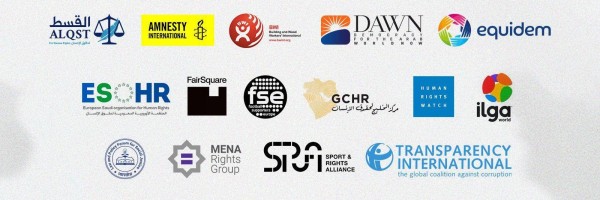بُعِثت الرسالة التالية إلى رئيس وزراء المغرب في 6 فبراير 2023.
إلى السيد أخنوش رئيس الوزراء المغربي،
في 1 فبراير 2023، وبعد جلسة واحدة، رفضت محكمة النقض في المغرب طلب الإفراج عن حسن آل ربيع وحكمت بتسليمه إلى المملكة العربية السعودية. وكانت القوات الأمنية المغربية قد اعتقلت آل ربيع في 14 يناير 2023 خلال محاولته السفر إلى تركيا.
بحسب تتبع المنظمات، فإن اعتقال آل ربيع، له علاقة بسلسلة أعمال انتقامية ضد عائلته بسبب مشاركة شقيقة منير في أحداث محافظة القطيف. ففي فبراير 2021، اعتقلت السعودية حسن، مع اثنين مع أشقائه، أحدهم علي. تعرض علي للإخفاء القسري، ثم حكم عليه بالإعدام في نوفمبر 2022 في محاكمة شابتها انتهاكات جسيمة، بما في ذلك انتزاع اعترافات تحت التعذيب. إضافة إلى ذلك، أعدمت السعودية في عام 2019، اثنين من أبناء عم حسن بعد محاكمات جائرة، تتعلق أيضا بمظاهرات القطيف.
بعد 10 أيام من اعتقال آل ربيع في المغرب، زار نائب رئيس أمن الدولة السعودي الوزير عبد الله بن فهد بن صالح العويس المغرب على رأس وفد أمني، حيث تم توقيع اتفاقية للتعاون الأمني ومكافحة الإرهاب.
نعتقد أن هذا القرار ليس فقط انتهاكًا صارخًا لحقوق الإنسان، والقوانين الدولية التي صادقت عليها المغرب و قوانينها المحلية، ولكن من المرجح أنه نتيجة مباشرة للتعاون الأمني القمعي المتصاعد بين البلدين. كما نشدد على أن التسليم هو مشاركة في الجرائم التي من المتوقع أن تمارس على آل ربيع حال وصوله إلى السعودية، والتي تبدأ من الاعتقال التعسفي، ولا تقف عن سوء المعاملة والتعذيب والمحاكمة غير العادلة وصولا إلى الأحكام التعسفية والتي قد تصل إلى الإعدام.
نشير إلى أن المغرب قرار التسليم، سينتهك اتفاقية مناهضة التعذيب مناهضة التعذيب وغيره من ضروب المعاملة أو العقوبة القاسية أو اللاإنسانية أو المهينة، التي صادق عليها المغرب عام 1993. وكانت لجنة مناهضة التعذيب التابعة للأمم المتحدة قد طلبت اليوم، من المغرب اتخاذ تدابير مؤقتة بتعليق تسليم الربيعة إلى حين مراجعة قضيته.
إضافة إلى ذلك، فإن الموافقة على تسليم حسن، هو انتهاك لقانون المسطرة الجنائية المغربي، الذي تنص المادة 721 من قانون الإجراءات الجنائية المغربي تنص على أن سلطات الدولة الطرف ملزمة برفض تسليم الأفراد عندما توجد أسباب جدية تدعو إلى الاعتقاد بأن الطلب التسليم المستند إلى جريمة من الجرائم العادية لم يقدم إليها إلا بقصد متابعة أو معاقبة شخص من أجل اعتبارات عنصرية أو دينية أو تتعلق بالجنسية أو بآراء سياسية، أو أن وضعية هذا الشخص قد تتعرض من جراء إحدى هذه الاعتبارات لخطر التشديد عليه.
ونشير إلى أن هذا القرار ليس فريدًا، إذ سلم المغرب في مارس 2021 رجل الأعمال أسامة الحسني إلى السعودية، رغم مخاوف على حياته وسلامته.
وعليه فإننا ، المنظمات الموقعة أدناه ، نحث مكتبكم على الامتناع عن التوقيع على أمر الإبعاد بحق آل ربيع
المنظمات الموقعة:
- الجمعية المغربية لحقوق الإنسان
- القسط لحقوق الإنسان
- منَا لحقوق الإنسان
- المنظمة الأوروبية السعودية لحقوق الإنسان
- المنظمة العالمية لمناهضة التعذيب
- مبادرة الحرية




